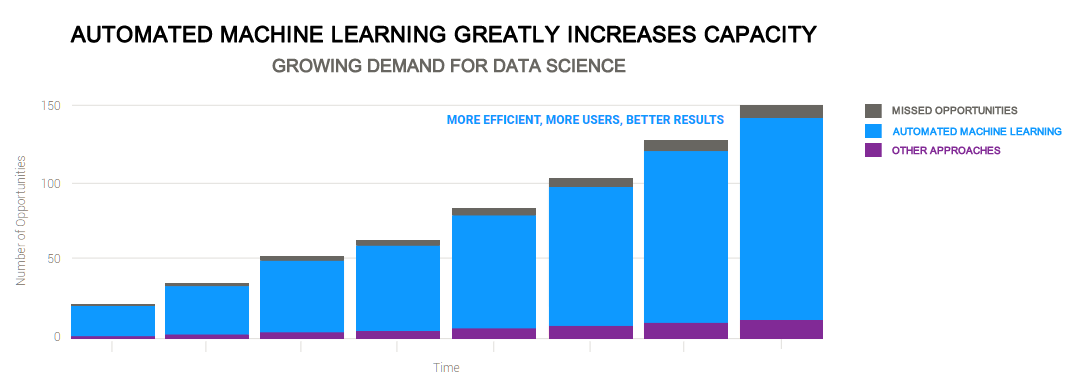According to a recent LinkedIn Workforce Report, demand for data scientists is literally off the charts. LinkedIn shared job market insights gained from over 150 million members in the United States starting new roles, learning new skills, and moving to new cities.
According to LinkedIn, “In 2015, there was a national surplus of people with data science skills. Three years later, the picture has changed markedly: data science skills shortages are present in almost every large U.S. city. Nationally, we have a shortage of 151,717 people with data science skills, with particularly acute shortages in New York City (34,032 people), the San Francisco Bay Area (31,798 people), and Los Angeles (12,251 people). As more industries rely on big data to make decisions, data science has become increasingly important across all industries, not just tech and finance. In that sense, it’s a good proxy for how today’s cutting-edge skills like AI & machine learning may spread to other industries and geographies in the future.”

Expand the Reach of Data Science to Seize More Opportunities
Demand for data scientist talent has never been greater. While project backlogs continue to grow, business opportunities are missed. In order to realize the benefits of data science, organizations need to utilize tools that will better scale and accelerate adoption.

Organizations can empower data-savvy analysts to fill data scientist gaps with automated machine learning. You should begin planning to learn and adopt augmented analytics through automated machine learning now. Even if you are struggling with current projects, you can still enjoy the swift, transformational impacts of automated machine learning in minutes.
In a 2018 case study led by Forrester Research, a well-known multinational bank recognized over $19 million of additional revenue gained from business analyst-led machine learning projects – not data scientist led projects. Using an automated machine learning platform from DataRobot, the bank’s business analysts delivered faster time-to-value by improving accuracy and productivity for pricing optimization and sales. This organization estimated at least a 10% productivity improvement for their business analysts over a period of three years. The exact revenue contributions from DataRobot projects remain confidential. The shared values are conservative.
Focus on What Matters Most
Automated machine learning is an ideal innovation for business intelligence and analytics professionals to advance their careers. You don’t need to be a data scientist to get immediate predictive insights and business value. If you use tools like Alteryx, Tableau, Qlik, TIBCO Spotfire or advanced analytics in Excel, paired with a little training and support from DataRobot’s world-class data science team, you can make the move to machine learning with automation to advance your career in one of the fastest growing, most exciting careers today.
I know there is skepticism when it comes to automation and data science. But DataRobot won’t replace data scientists – it expands the reach of machine learning.
Today there is way too much data to manually analyze. Automated machine learning solves complex problems smarter and faster than ever before. Even if you don’t want to use what-if analysis or predictive models, automation helps you efficiently find the right answers, allowing you to narrow down what to analyze and focusing your efforts on what matters most. Often in trials and pilots, you will uncover hidden insights that never would have been found using other techniques.
I know there is skepticism when it comes to automation and data science. But DataRobot won’t replace data scientists – it expands the reach of machine learning. There was a similar sentiment and resistance when the world began shifting towards modern, self-service analytics to empower the business. At the end of the day, DataRobot allows data scientists and business analysts to be more productive. My advice – don’t ignore, fear, or fight these advances in our profession. Lead the way forward in your organization. Help analytics, business intelligence professionals, and data engineers learn how to properly use these innovations.
By leveraging the best of mind and machine, automated machine learning is the most effective way to quickly build and deploy machine learning models that power the AI-driven enterprise. Stop waiting for data scientists and begin taking machine learning and AI initiatives into your own hands – no coding required.

About the Author
Jen Underwood, Senior Director of Product Marketing at DataRobot, has over 20 years of experience in “hands-on” development of data warehouses, reporting and advanced analytics solutions. In addition to keeping a constant pulse on industry trends, she enjoys digging into oceans of data. Previously, Jen held worldwide product management roles at Microsoft, advised vendors as an independent industry analyst, and led technical analytics implementations for global system implementation firms. She has a Bachelor of Business Administration – Marketing, Cum Laude from the University of Wisconsin, Milwaukee and a post-graduate certificate in Computer Science – Data Mining from the University of California, San Diego.
About the author
Jen Underwood
Senior Director of Product Marketing, DataRobot
Jen Underwood, Sr. Director Product Marketing, has held worldwide analytics product management roles at Microsoft and served as a technical lead for system implementation firms. She has experience launching new products and turning around failed projects in enterprise data warehousing, reporting, and advanced analytics. Today she designs products and helps analytics professionals learn how to solve complex problems with machine learning in the emerging citizen data science segment. Jen has a Bachelor of Business Administration – Marketing, Cum Laude from the University of Wisconsin, Milwaukee and a post-graduate certificate in Computer Science – Data Mining from the University of California, San Diego.










